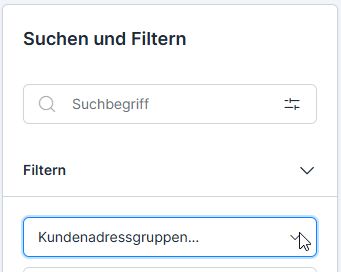Our system offers various options for categorizing customer addresses:
1. customer groups #
Customer groups are used to roughly categorize customer addresses. Each address can only be assigned to one customer group. The customer group also controls whether company data and/or personal data (surname + first name) can be entered and how entries are checked.

In the customer address group settings, you can define which customer group can and should contain which data. When saving, the system checks whether the selected data has been entered. (Private data required – the address is not saved without private data).

It is possible to filter the customer addresses by group.

2. properties #
Properties are user-defined extensions of fields in the customer master data. These fields do not exist in the standard database, but serve as additional information, e.g. work area, number of employees.

You can store any number of properties for the customer addresses. This is described in more detail here (Properties & Assets section): Create new customer address

The system offers additional filtering according to properties:

3. authorization roles #
Authorization roles control access to the partner portal (extranet) and allow external partners (customers) specific access to the system (3 and 4).

Important to note: Authorization roles only control the authorizations and have no other functions and cannot be evaluated.
You can find out how to define authorization roles for customers here: Authorization roles for customers
4. relationships #
Our system is not based on a hierarchy, but on a network model. This means that each address is independent and can have any relationships with other addresses. In the old system (version X2) there was a fixed hierarchy, whereas the new system allows more flexible relationships.

Example: Hans Muster may have a relationship as managing director with the company Muster AG.
At the same time, he can be listed as a member of the Board of Directors of Muster Holding AG.
In turn, Muster Holding AG may have a parent company relationship with Muster AG.
This network model offers more flexibility, as different business relationships can be mapped.
Read more about the relationship and customer networks here: Customer networks